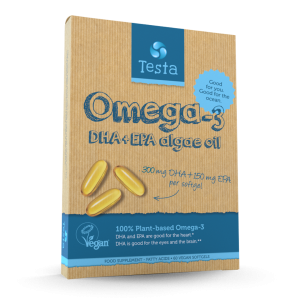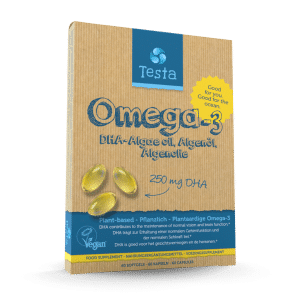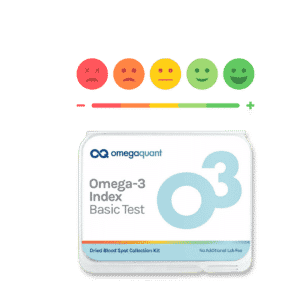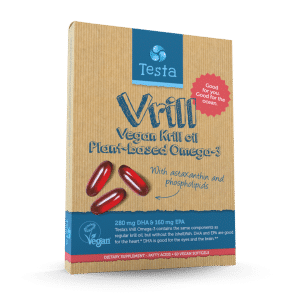Omega-3 for Seniors

- 100% plant-based from algae
- Good for heart, brain, & eyes
- Certified 'Plastic Negative'
- 100% Plant-based from algae
- Good for brain, eyes, and a healthy pregnancy
- Certified 'Plastic Negative'
- Gain insights into your omega-3 index
- Independent certified laboratory
- Including advice to increase levels
- 100% Plant-based krill oil alternative from algae
- Enhanced absorption due to phospholipids
- High in astaxanthin
DHA & EPA Omega-3 Algae Oil Capsules
DHA Omega-3 Algae Oil Capsules
Omega-3 Index Self-Test
Vegan Krill Oil DHA & EPA Omega-3
Although all groups should take omega-3s, this need becomes more evident in elderly years. As our brain and eye health begin to dwindle, DHA omega-3 consumption becomes especially crucial.
Keep reading and make sure to share this info with any elderly friends and loved ones!
What Are Omega-3s? An Overview
Omega-3s are healthy fatty acids that support brain, eye, heart, and joint health. They are also excellent allies for our immune system and can reduce inflammation. There are several types of omega-3s that can benefit our health. The main forms of omega-3 include ALA, EPA, and DHA.
Omega-3 For Seniors: Why Are They Essential?
For seniors, the number one concern is typically eye and brain health. In this case, DHA is their #1 ally. However, if their concern is heart health, a combination of DHA and EPA can better support their health goals. Meanwhile, ALA helps to boost the absorption of both types of omega-3s.
Omega-3s are found in every cell of our bodies, and DHA is especially present in our brain and retina. Our bodies do not produce this type of fatty acid on their own. This makes them an essential nutrient that should be consumed through our diet.
How Much Omega-3 Do the Elderly Need?
Seniors need at least 1.6g of ALA daily. This form of omega-3 converts into docosahexaenoic acid (DHA) and eicosapentaenoic acid (EPA) in the body. However, the amount converted is minimal. For this reason, experts recommend adults take 250mg of additional combined DHA and EPA daily, an amount you’ll surely find in the best omega-3 for elderly individuals, mentioned below.
Top Sources of Omega-3 for Seniors
To avoid the heavy metals and ocean toxins found in fish, seniors can obtain their omega-3s from various plant-based sources. These include flaxseeds, chia seeds, walnuts, and hemp seeds.
They can try sprinkling these nutritious nuts and seeds over oatmeal, salads, bowls, soups, and more for beneficial ALAs. Plant-based DHA and EPA are trickier to come across in plant foods. However, fish get their omega-3s from a plant source, and we can, too!



